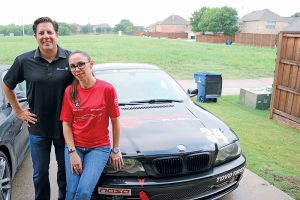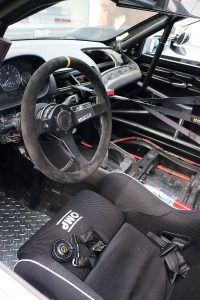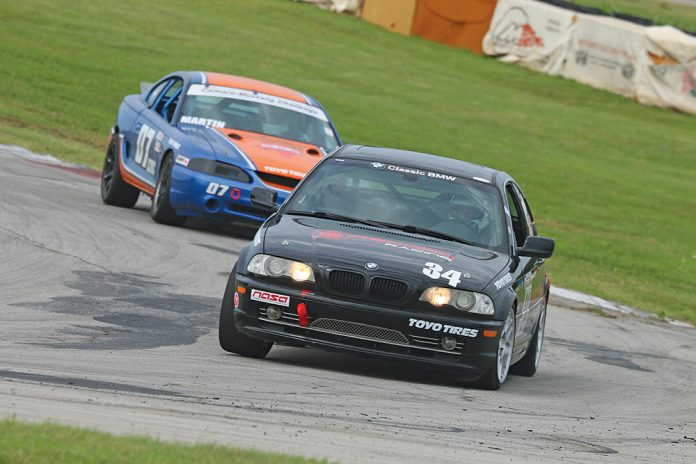I am in the unique position that I get to write, occasionally, about incredible people and events in Frisco, but, this time, my article is about something I am involved with personally: road racing and how my husband and I use it to help prove to local students that science and math do have practical applications … in a cool way.
My husband, David Record, and I road race. It has been something we wanted to do for years, but settled for track days in our street cars. Recently, we took the big leap and have not looked back. In late 2016, we bought a running 2003 BMW 330ci (that would have made a practical daily driver) and paid Classic BMW in Plano to rip it apart and turn it into a purpose-built Spec E46 race car to run wheel-to-wheel with other cars in the National Auto Sport Association (NASA), Sports Car Club of America (SCCA) and BMW Car Club of America (BMWCCA).
 In our first season this year, we have raced in Cresson, Texas, Hallett, OK, and will be heading to New Orleans soon. We are starting small with the goal of qualifying for more national events to become those racers from Frisco everyone tries to beat. Our long-term goals are to race in national events at places like Circuit of the Americas and to race in 24-hour endurance races.
In our first season this year, we have raced in Cresson, Texas, Hallett, OK, and will be heading to New Orleans soon. We are starting small with the goal of qualifying for more national events to become those racers from Frisco everyone tries to beat. Our long-term goals are to race in national events at places like Circuit of the Americas and to race in 24-hour endurance races.
David was invited to watch a race when he lived in Calif. at Sonoma Raceway (then called Sears Point). He went behind the scenes and the racing bug immediately took hold. He started entering high performance driving events (HPDE) and worked his way up through those ranks, starting as a rookie, all the way up to driving his car on the track solo and the ability to pass anywhere. When he moved to Texas in 2004, he continued entering HPDEs, but knew he wanted to take his track time more seriously. Getting married and having kids may have delayed the timing, but it never left his heart and mind.
My story is a little different. I grew up around drag racing. My father had a Pro Modified drag bike team and they raced in the International Drag Bike Association (IDBA) (no longer in existence) throughout my childhood. I spent countless Friday nights and weekends at the Texas Motorplex and occasionally got to go on road trips for their races. At age 15, I got a junior dragster license, then jumped up to super comp cars at age 17, but never really raced. In my early twenties, I was fortunate enough to attend Skip Barber racing schools, both at Lime Rock in Conn. and Laguna Seca in Calif. That is when I knew what kind of racing drew me in. I attended several HPDEs, but took time off to have kids. No, they will not let you drive on a racetrack if you are pregnant (I asked). As time passed, and our kids got a little older, I could not let go of the idea of racing. It is in my blood, and once the obsession takes hold, it never leaves.
In pursuit of our dreams, we had a realization. As we are racing in our 30s and 40s, we have had several young people ask us how we got started. They are eager to try it out, but do not know where to go to take those first steps. Young girls (and the more seasoned ladies) are amazed to see that I drive, work on the car and do everything the guys do. We have an opportunity to show young minds some of the possibilities the world offers that many might not otherwise see.
 If it were not for my father having a drag racing team while I was growing up, I may not have become so interested in motorsports. If David never met his mentor who taught him about racing Datsuns, he may still be wondering what to do with his free time. We do not expect to take this hobby of ours to the professional level (although, it would be a dream come true, if it ever happens), but by teaching young people about everything that goes into racing, they might get to make a career out of it — perhaps as a driver, an engineer or on the business side. It is important for them to understand everything involved with the sport. Even if they have seen a race on television, there is so much more that goes into preparing for each race. And that is where Record Racing steps in.
If it were not for my father having a drag racing team while I was growing up, I may not have become so interested in motorsports. If David never met his mentor who taught him about racing Datsuns, he may still be wondering what to do with his free time. We do not expect to take this hobby of ours to the professional level (although, it would be a dream come true, if it ever happens), but by teaching young people about everything that goes into racing, they might get to make a career out of it — perhaps as a driver, an engineer or on the business side. It is important for them to understand everything involved with the sport. Even if they have seen a race on television, there is so much more that goes into preparing for each race. And that is where Record Racing steps in.
What do we cover when we talk to young people? We can tailor our conversation to be age-appropriate, as well as focus on a particular topic, if needed. Of course, it can be fun to talk about how fast we have driven or show videos of our races where we have passed another car or even met some famous racecar drivers, but that is only to get their attention. We work with teachers to make sure it fits their students’ needs.
One topic we cover includes everything about driving safety — all the safety equipment that goes into building a proper racecar, the safety equipment that goes on us every time we get in the car and safety in daily driving situations. It can surprise many kids to learn about some of the history of racing and how most of the safety features in cars today evolved because they started in racecars.
Another topic is the importance of science and math — both in building the car and driving it on the track. We go into detail about the angles and construction of a roll cage and how those angles make it stronger. We can talk for hours (but we keep it short) about apexes and the fastest way around different tracks — how to go faster by finding the straightest lines.
And for the young ladies, we know a lot of racing history and can talk about the women pioneers in the sport, including their contributions and what they had to do to be taken seriously by men in their day. Hearing about trailblazers in the 1940s, 1950s and 1960s can be very inspirational. Even if the girls do not want to explore opportunities in motorsports, it can help inspire them to chase their own dreams that might involve challenging the status quo.
When I spoke to a local professional racer, Jesse Iwuji, a graduate of Hebron High School in Carrollton, he shared, “Science and math are huge in racing. I use science in the way of physics, weather, dynamics and more to calculate the ability of the racecars to handle on the tracks we race. Things we look at are weight transfer, thermodynamics of the tires and motor, aerodynamics of the body of the vehicles and how air flow affects vehicles on the track, body physiology and how heat stress affects me as a driver.” Mr. Iwuji grew up watching the television show “Knight Rider,” and that started his interest in cars. That grew into watching racing and after college, he did a lot of research on how to stop dreaming and start racing.
He currently races in the ARCA Racing Series and the K&N Pro Series West (the cars look similar to those in NASCAR). He loves the sounds of the track, the competition, the intensity of racing and the beauty of the cars. When asked about the value of being introduced to the world of racing, he has positive things to say. “It brings a huge value. Top race teams have engineers, sports doctors, lawyers, business development teams, marketing personnel, auto technicians and more on their teams. These are great quality jobs that required those people to get a great education.”
Record Racing calls Frisco home, but we also take a great personal interest in connecting with young people. We want to help schools and teachers by showing kids exciting yet real reasons to listen to what is being taught to them. We want to show them opportunities they may have never considered. We want to find ways to encourage and inspire young people to chase their dreams, work through tough times to reach rewards, challenge the status quo and make their mark. Check out recordracing.com to schedule a class visit in the Frisco area. We bring the car, you bring the students and we will make learning fun!


